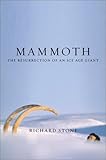Mammoth : the resurrection of an Ice Age giant / Richard Stone.
Material type: TextPublication details: Cambridge, Mass. : Perseus Pub., c2001.Description: xii, 242 p., [8] p. of plates : ill., maps ; 22 cmISBN:
TextPublication details: Cambridge, Mass. : Perseus Pub., c2001.Description: xii, 242 p., [8] p. of plates : ill., maps ; 22 cmISBN: - 0738202819 :
- 9780738202815
- 0738207756 (pbk.)
- 9780738207759 (pbk.)
- 569.67
- QE 882 S877m 2001
| Item type | Current library | Home library | Collection | Shelving location | Call number | Vol info | Copy number | Status | Date due | Barcode |
|---|---|---|---|---|---|---|---|---|---|---|
 Libro
Libro
|
Biblioteca Juan Bosch | Biblioteca Juan Bosch | Humanidades | Humanidades (4to. Piso) | QE 882 S877m 2001 (Browse shelf(Opens below)) | 1 | 1 | Available | 00000063651 |
Acknowledgments -- Raising the dead -- Treasure of the wooden hills -- First design the Kobe steak -- River of bones -- Rat beneath the ice -- Deadly chill -- Killer wave of the new world -- Nastier than Ebola -- Big lift -- DNA menagerie -- Pleistocene park -- Into the ice cave -- Epilogue.
No fabled creature of the Pleistocene Era has a more powerful hold on the imagination than does the woolly mammoth. Cave paintings of the giant beasts hint at the profound role they played in early human culture-our Ice Age ancestors built igloo-shaped huts out of mammoth bones and even feasted on mammoth tongues. Eager to uncover more clues to this mystical prehistoric age, explorers since the time of Peter the Great have scoured Siberia for mammoth remains. Now a new generation of explorers has taken to the tundra. Armed with GPS, ground-penetrating radar, and Soviet-era military helicopters, they seek an elusive prize: a mammoth carcass that will help determine how the creature lived, how it died-and how it might be brought back to life. Science writer Richard Stone follows two teams of explorers--one Russian/Japanese, the other a French-led consortium--as they battle bitter cold, high winds, supply shortages, and the deeply rooted superstitions of indigenous peoples who fear the consequences of awakening the "rat beneath the ice." Stone travels from St. Petersburg to the Arctic Circle, from the North Sea to high-tech Japanese laboratories, as he traces the sometimes-surreal quest of these intrepid scientists, whose work could well rewrite our planet's evolutionary history.
Includes bibliographical references (p. 219-227) and index.
Maps on lining papers.


There are no comments on this title.